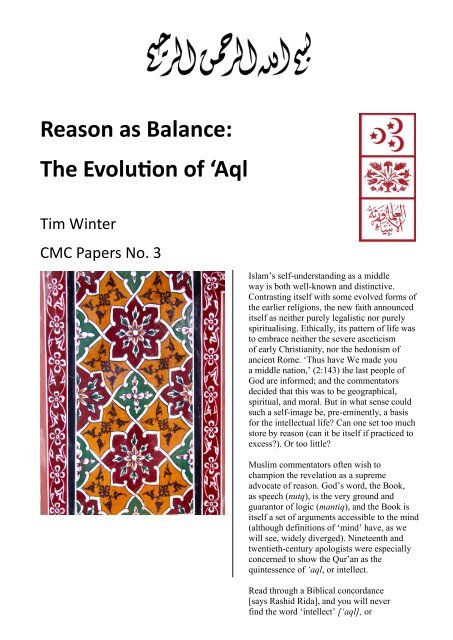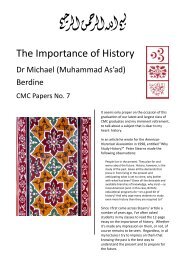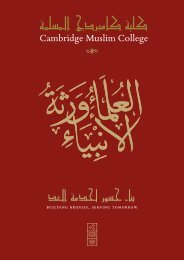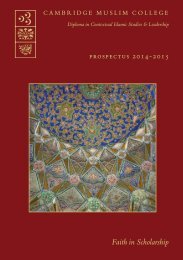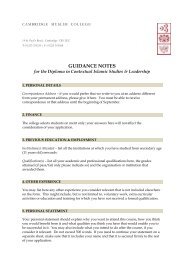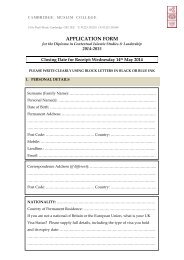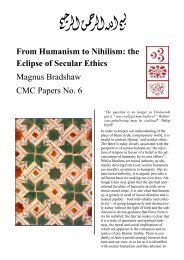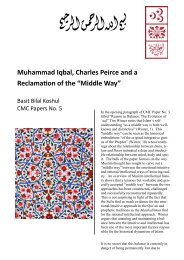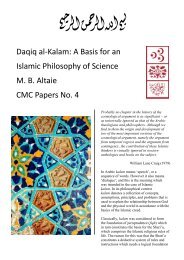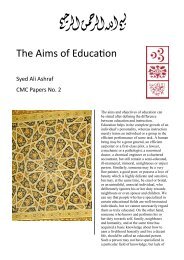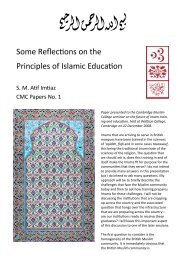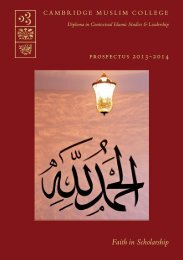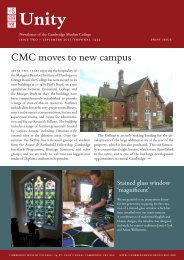You also want an ePaper? Increase the reach of your titles
YUMPU automatically turns print PDFs into web optimized ePapers that Google loves.
Reason as Balance:<br />
The Evolution of ‘Aql<br />
Tim Winter<br />
<strong>CMC</strong> <strong>Papers</strong> No. 3<br />
Islam’s self-understanding as a middle<br />
way is both well-known and distinctive.<br />
Contrasting itself with some evolved forms of<br />
the earlier religions, the new faith announced<br />
itself as neither purely legalistic nor purely<br />
spiritualising. Ethically, its pattern of life was<br />
to embrace neither the severe asceticism<br />
of early Christianity, nor the hedonism of<br />
ancient Rome. ‘Thus have We made you<br />
a middle nation,’ (2:143) the last people of<br />
God are informed; and the commentators<br />
decided that this was to be geographical,<br />
spiritual, and moral. But in what sense could<br />
such a self-image be, pre-eminently, a basis<br />
for the intellectual life? Can one set too much<br />
store by reason (can it be itself if practiced to<br />
excess?). Or too little?<br />
Muslim commentators often wish to<br />
champion the revelation as a supreme<br />
advocate of reason. God’s word, the Book,<br />
as speech (nutq), is the very ground and<br />
guarantor of logic (mantiq), and the Book is<br />
itself a set of arguments accessible to the mind<br />
(although definitions of ‘mind’ have, as we<br />
will see, widely diverged). Nineteenth and<br />
twentieth-century apologists were especially<br />
concerned to show the Qur’an as the<br />
quintessence of ‘aql, or intellect.<br />
Read through a Biblical concordance<br />
[says Rashid Rida], and you will never<br />
find the word ‘intellect’ [‘aql], or
Reason as Balance: The Evolution of ‘Aql<br />
any synonym for this human faculty which<br />
raises human beings above the entire animal<br />
kingdom, whether it be ‘insight’ [lubb] or<br />
‘intelligence’ [nuha]. This is because this<br />
category is never mentioned in either the Old<br />
or the New Testament, since it is not a basis<br />
for the understanding of religion and its<br />
arguments and lessons; neither is the Bible’s<br />
religious discourse rationally oriented or<br />
based on reason. Similarly absent are the<br />
words ‘thinking’ [tafakkur],<br />
contemplation’ [tadabbur], and looking at the<br />
world, all of which are among the greatest<br />
functions of the intellect. By contrast, the<br />
intellect is referred to approximately fifty<br />
times by name in the Noble Qur’an; the<br />
phrase ‘people of insight’ [ulu’l-albab], which<br />
is to say, ‘people of intellect’, appears more<br />
than ten times, while ‘people of discernment’<br />
[ulu’l-nuha] is also to be found, once, at<br />
the end of Sura Taha. Furthermore, these<br />
Qur’anic references mostly apply to God’s<br />
signs [ayat], and to the fact that those who are<br />
addressed by them, who understand them and<br />
receive guidance through them, are the<br />
intelligent [‘uqala’]. Most of these verses<br />
pertain to the physical universe, which point<br />
to God’s knowledge, will, wisdom, and<br />
compassion. 1<br />
Such polemics were reactive against a<br />
European belief in ‘Oriental unreason’.<br />
Although in the eighteenth century it was not<br />
uncommon for Europeans to compare Islam<br />
favourably with Catholic ‘superstition and<br />
obscurantism’, 2 the racial and imperial<br />
confidences of the nineteenth century inverted<br />
the image. Ernest Rénan, riding the warhorse<br />
of European triumphalism, had attacked Islam<br />
as a kind of intensified Judaism, an irrational<br />
legalism which rejected the spirit of reason<br />
and needed to be fought without mercy. 3<br />
Hence the Muslim apologist’s retort that Islam<br />
is quintessentially reasonable, a view which<br />
also drew strength from the growing polemic<br />
against Sufism, understood in Suhrawardi’s<br />
sense as an escape from the city of reason to<br />
the wilderness where God can be found. 4 Ali<br />
2<br />
Bulaç has documented the recurrence of this<br />
Islam/rationality trope as perhaps the most<br />
characteristic apologetic theme in modern<br />
Islam, in Turkey and elsewhere. 5 In the<br />
Western milieu, many converts to Islam claim<br />
that they are attracted to what they regard as<br />
its clear, rationally-accessible teachings,<br />
unobscured by elaborate mysteries. 6 But it is<br />
not only insiders who wish to take this view.<br />
Non-Muslim academic accounts, which have<br />
largely left Rénan behind, now frequently<br />
draw attention to the central role of reason in<br />
Islamic theology. 7 Oliver Leaman, for<br />
instance, claims that ‘whereas Judaism is<br />
strongly linked with ethnicity, and<br />
Christianity with a leap of faith, Islam has<br />
successfully grown, by contrast with these<br />
religions, by stressing its rationality and<br />
evidentiality.’ 8 Josef Van Ess, author of the<br />
greatest history of Islamic theology ever to<br />
have appeared in a European language,<br />
concludes in rather similar terms: ‘Christianity<br />
speaks of the “mysteries” of faith; Islam has<br />
nothing like that. For Saint Paul, reason<br />
belongs to the realm of the “flesh”, for<br />
Muslims, reason, ‘aql, has always been the<br />
chief faculty granted human beings by God.’ 9<br />
All these attempts, Muslim and non-<br />
Muslim, to portray Islam as the reasonable<br />
religion par excellence root themselves in the<br />
Qur’anic text. ‘The Qur’an does indeed,’ says<br />
Leaman, ‘display an unusual commitment to<br />
argument and logic in its self-explanation,’<br />
10 and a systematic exploration of this has<br />
very recently been offered by Rosalind<br />
Gwynne. 11 Here, however, lies the great<br />
fault-line in modern Islam, whose origins are<br />
ancient, pre-dating in some respects the<br />
religion itself. Modern fundamentalist<br />
tendencies, emanating frequently from Saudi<br />
Arabia and tracing their ancestry to the<br />
scriptures via Ibn Taymiya (d.1328), reject<br />
formal dialectics, while not accepting a selfdefinition<br />
as ‘irrationalist’. For such thinkers,<br />
all important truth, which is to say, truth<br />
which saves, is necessarily explicit in the<br />
Book, from which ‘We have omitted
Reason as Balance: The Evolution of ‘Aql<br />
nothing’ (6:38). Scripture is ‘clear’ (mubin),<br />
and God has not burdened humanity with the<br />
demand to evolve elaborate metaphysical<br />
interpretations either of His evidences in<br />
nature, or in the specific revelation of the<br />
Qur’an. Those who do so are guilty of<br />
underestimating both the clarity of the<br />
Book, and the benign intentions of a God<br />
who wishes all to be saved, including those<br />
incapable of following a syllogism. 12<br />
Both advocates and enemies of reason base<br />
their positions in scripture. Who is normative?<br />
One way of answering might be to point to the<br />
unpopularity of Ibn Taymiya’s Hanbalite<br />
fideism, and to the centrality of sophisticated<br />
philosophical theology in the medieval<br />
madrasa curriculum (the manuals of Jurjani,<br />
Iji, Nasafi, and Taftazani). Most scholars<br />
voted with their feet, and welcomed the logicbased<br />
theologies which, finally schematised<br />
by Razi, traced their roots back to early<br />
Islam’s need to deploy reason against<br />
schismatics. Yet the recent revival of<br />
Hanbalite and Taymiyan fortunes, rooted in an<br />
understanding of the intentions of scripture,<br />
cannot be dismissed so easily as un-Qur’anic.<br />
Any attempt at an arbitration must consider<br />
the texts themselves.<br />
The Qur’an is, like any prophetic deliverance,<br />
a staccato, ecstatic, collocation of insights.<br />
Famously, but not uniquely (one thinks<br />
of the Psalms, for instance, or Oriental<br />
lectionaries, or most collections of poetry),<br />
it does not respect any thematic sequence. 13<br />
Despite Gwynne’s insights, most Muslims<br />
experience it not as a set of arguments, but as<br />
a dithyramb which irresistibly transforms the<br />
soul. The following account, describing an<br />
illiterate woman in India, gives an excellent<br />
sense of this:<br />
She would then spread the prayer-mat, a<br />
beautiful soft Persian piece, its direction<br />
towards the East. She was now going<br />
towards the corner in the room where<br />
wrapped in green silk lay the Qur’an. She<br />
3<br />
would take out the Qur’an and hold it to her<br />
heart. Her eyes then were full of tears. She<br />
was holding a book which she loved and respected<br />
so much and yet she was unable to<br />
read. She would then recall, crying like a<br />
child, that moment when the Voice repeatedly<br />
said to the Prophet in the cave of Hira:<br />
Read, Read in the name of the Lord. And the<br />
Prophet had said in utter helplessness: I cannot<br />
read.<br />
Then she would return to the prayer-mat,<br />
lifting the Qur’an above her head, saying as<br />
though: O Book! You are above my understanding.<br />
My head is nothing more than a<br />
place whereupon you rest.<br />
Having sat down not occupying the entire<br />
prayer-mat but a part of it, for to occupy the<br />
whole of the prayer-mat was to her an act of<br />
arrogance, she would open the book knowing<br />
only to keep the right side up, and to<br />
begin where she had left the previous day.<br />
For a long time she would allow her eyes to<br />
rest on the two open pages before her. The<br />
letters in green ink from right to left, row<br />
beneath row, each shape mysteriously captivating,<br />
each dot below or above a letter an<br />
epitome of the entire scripture, each assembly<br />
of letters a group of dervishes raising<br />
their heads in zikr, each gap between two<br />
enigmatic shapes a leap from this world to<br />
the next, and each ending the advent of the<br />
Day of Resurrection.<br />
She would thus see a thousand images in the<br />
procession of that script and would move<br />
from vision to vision. After spending much<br />
time just looking at the open book, she<br />
would then, with a strange light glowing on<br />
her face, lift her right hand and with the<br />
right finger start touching the letters of each<br />
line, then another line, to the end of the<br />
page. What transpired between the book and<br />
that touch, and what knowledge passed,<br />
without any mediation of conscious thought,<br />
directly into her soul, only the Qur’an and
Reason as Balance: The Evolution of ‘Aql<br />
that strange reciter could know. The entire<br />
world stood still at this amazing recital<br />
without words, without meaning, without<br />
knowledge. With that touch a unity was<br />
established between her and the Qur’an. At<br />
that moment she had passed into a state of<br />
total identity with the word of God. Her<br />
inability to read the scripture was her ability<br />
to hear once again: Read! Read, in the<br />
Name of thy Lord! 14<br />
Truth has a calligraphic form, it seems; and<br />
we are unsurprised to note the centrality<br />
of calligraphy, a minor art in Christendom,<br />
to almost all historic Muslim civilisations.<br />
Scripture (kitab) seems to imply writing, and<br />
there is a way in which its writing’s form<br />
unveils reality in a way that transcends reason.<br />
But even more significant has been aurality<br />
and a receptivity to the mantic voice of the<br />
Unlimited. The illiterate woman of Delhi,<br />
finding truth in the Arabic cursive mysteries,<br />
is wholly Islamic, but is less representative<br />
than the auditor of Qur’anic cantillation,<br />
the Islamic art, that is to say, mediator of<br />
the sacred, par excellence. Here is Isabelle<br />
Eberhardt, in Algiers:<br />
The place was cool and dark as I went in,<br />
and a handful of oil lamps were the only<br />
source of light.<br />
A feeling of ancient Islam, tranquil and<br />
mysterious.<br />
Stood for a long time near the mihrab.<br />
Somewhere far behind us, a clear, fresh,<br />
high voice went up, a dreamlike voice that<br />
took turns with that of the elderly imam<br />
standing in the mihrab where he recited the<br />
fatiha with his quavering voice. Standing<br />
next to each other, we all prayed as we<br />
listened to the exhilarating yet solemn<br />
exchange between those two voices. The<br />
one in front of us sounded old and hoarse,<br />
but gradually grew louder till it was strong<br />
and powerful, while the other one seemed<br />
4<br />
to come from somewhere high up in the<br />
mosque’s dark reaches as it sang<br />
triumphantly in regular intervals of its<br />
unshakeable, radiant faith in Allah and his<br />
Prophet ... I felt almost in ecstasy, my chest<br />
tightening and my heart soaring up towards<br />
the heavenly regions that the second voice<br />
seemed to be coming from in a tone of melancholy<br />
joy, utterly convinced and at<br />
peace.<br />
Oh, to lie upon the rugs of some silent<br />
mosque, far from the mindless noise of city<br />
life, and, eyes closed, the soul’s gaze<br />
turned heavenwards, listen to Islam’s<br />
song forever! 15<br />
This is the Qur’an as healing (17:82), a balm<br />
for hearts. The scripture seems to imply that<br />
our tragedy is an ignorant alienation from<br />
the Real, wherein lies all wholeness and<br />
appropriateness, and that only Heaven can<br />
send down the rain which revives the hearts.<br />
Whether it saves through its calligraphy or<br />
its cantillation, the Book does not seem to<br />
be saving through reason; it does not deny it,<br />
but it insists on ‘descending upon your heart’<br />
(2:97), for its Author is not reached by the<br />
faculties of perception (6:103). Islam has a<br />
historic hospitality to Platonism, regretted by<br />
modernist advocates of a supposed Averroist<br />
rationalism, but noted in detail by Henry<br />
Corbin and others; and this is to be attributed<br />
not only to the Platonic resolution of all<br />
diversity to the One Source, so congenial<br />
to Islam’s rejection of a triune or other<br />
differentiation within the Godhead; but also<br />
to the sense that, as in the Timaeus, the One<br />
is manifest aesthetically and, particularly,<br />
musically, in the ground of creation. Ion, in<br />
the early dialogue with Socrates,<br />
acknowledges that as a singer of poems he is<br />
an instrument played upon by a supernatural<br />
power. And the Prophet Muhammad, like him,<br />
is an Aeolian harp: the wind plays him, while<br />
his personhood contributes nothing; the Voice<br />
is therefore the pure sound of the Unseen. The<br />
Qur’an, a web of ‘signs’, is in this rather
Reason as Balance: The Evolution of ‘Aql<br />
Platonic sense understood as the voice of the<br />
divine substrate of creation; it is the true<br />
music of the spheres. The ascent to the One,<br />
therefore, is not through the logic-chopping<br />
powers of our ‘dingy clay’, but through<br />
acquiring a true and loving ear that can<br />
properly hear this music.<br />
Could it be that the very existence of<br />
prophecy, which the scripture proclaims as<br />
necessary to man’s salvation, indicates that<br />
human reason, unaided, cannot reach truth?<br />
Is this the crux of the argument not only<br />
between Plato and Aristotle, but between<br />
Athens and Jerusalem?<br />
Perhaps, some souls have imagined, this is<br />
the lesson of the Qur’anic prologue where<br />
the Devil, Iblis, falls from grace. God<br />
has commanded the angels to prostrate<br />
themselves before Adam, the newly-created,<br />
sleepy creature, and they do so, ‘except Iblis’,<br />
who protests that ‘You have created me of<br />
fire, and him of clay.’ (7:12) Hence this proud<br />
worshipper of God Alone, who uses logic<br />
to defy God’s own command, is cast out,<br />
to be the calamity of the world. Meditating<br />
upon this story, some Muslims have taken<br />
it as a warning against a presumptuous,<br />
vainglorious reliance upon reason, and against<br />
the sin which originated in a syllogism. God’s<br />
command, for His lovers, is enough; His<br />
beauty makes all argument irrelevant. Here is<br />
Rumi:<br />
O master, (you must avoid) the analogy<br />
drawn by the low senses in regard to the<br />
Revelation which is illimitable.<br />
If your sensuous ear is fit for<br />
(understanding) the letter (of the<br />
Revelation), know that your ear that<br />
receives the unseen (meaning) is deaf.<br />
5<br />
The first person who produced these<br />
paltry analogies in the presence of the<br />
Lights of God was Iblis.<br />
He said, ‘Beyond doubt fire is superior<br />
to earth: I am of fire, and he (Adam) is<br />
of dingy earth’. 16<br />
For this hugely-influential reading of the<br />
Qur’an (and Rumi is unchallenged as<br />
Islam’s greatest poet), love is the Buraq, the<br />
miraculous winged beast that helps us ascend<br />
to true knowledge. Reason, the steed of the<br />
formal theologians, is a noble part of God’s<br />
creation, but is desperately slow and limited.<br />
Intelligence is (like) swimming in the<br />
seas: he (the swimmer) is not saved: he<br />
is drowned at the end of the business.<br />
Leave off swimming, let pride and<br />
enmity go; this is not the Oxus or a<br />
(lesser) river, it is an ocean;<br />
And, moreover, (it is) the deep Ocean<br />
without refuge: it sweeps away the<br />
seven seas like straw.<br />
Love is as a ship for the elect: seldom is<br />
calamity (the result); for the most part it<br />
is deliverance.<br />
Sell intelligence and buy bewilderment:<br />
intelligence is opinion, while<br />
bewilderment is (immediate) vision.<br />
Sacrifice your understanding in the<br />
presence of Mustafa (Muhammad): say,<br />
‘hasbiya ’llah, for God sufficeth me’. 17<br />
Muslims thus find themselves spread along a<br />
spectrum, each enjoying a bright colour of<br />
the faith. The Qur’an is so replete that Ibn<br />
Rushd, the iconic Arab ‘rationalist’, can use<br />
its verses as examples of rational induction; 18<br />
and modern Muslim advocates of reason<br />
can and do use it to dispel mystical fancies.
Reason as Balance: The Evolution of ‘Aql<br />
But the fact of its origin in the empyrean<br />
has made it also the religion’s theophany<br />
of theophanies, a mystic fact, whose very<br />
shape or sound inspires an ecstasy that seems<br />
to show God more fully than any logical<br />
inference ever could.<br />
The Qur’an, then, seems to be the authentic<br />
root of two disciplines whose mutual relations<br />
are controversial: formal systematic theology<br />
(kalam), and Sufism (tasawwuf). Sufism is<br />
typically absent from the madrasa curriculum,<br />
which gives pride of place to kalam. And<br />
kalam presents itself as a fiercely rationalistic<br />
discipline, according to some more so even<br />
than Islamic philosophy (falsafa). 19<br />
A standard kalam text such as Taftazani’s<br />
(d.1390) Sharh al-’Aqa’id devotes three<br />
quarters of its length to systematic<br />
metaphysics (ilahiyyat), with the remainder<br />
dedicated to issues of prophecy and the<br />
afterlife which can only be demonstrated<br />
through revelation. Such texts defined<br />
orthodoxy; yet they seem to have been less<br />
influential upon the minds of most Muslims<br />
than the passionate Sufism of the likes of<br />
Rumi, whose pessimism about kalam is<br />
evident.<br />
Here we are faced with an evolving tension<br />
within classical Islamic intellectual life and<br />
society of a kind which required – and<br />
occasionally delivered – brilliant reformers.<br />
It is striking that only in a few texts do<br />
we observe an attempt to provide a grand<br />
synthesis of the two approaches, which we<br />
might, to borrow European terminology,<br />
describe as the logical and the passional.<br />
Ghazali (d.1111) is the most obvious, and<br />
successful, example. Other claimants would<br />
include Ibn ‘Arabi (d.1240), Ibn Kemal (d.<br />
1534), Shah Wali Allah al-Dihlawi (d.1762),<br />
and Sait Nursi (d. 1960), before we enter the<br />
purely modern period, where such synthetic<br />
theologies have been challenged by<br />
modernists and fundamentalists, both of<br />
whom, for different reasons, are uneasy with<br />
mysticism and kalam.<br />
6<br />
This synthetic renewal, which often draws<br />
in individuals acclaimed as the ‘renewers’<br />
(mujaddid) of their centuries, 20 is a key<br />
dynamic in Islamic religion and history.<br />
Hence tendencies perceived as erroneous, or<br />
even heretical, may be helpfully understood<br />
as the result of an imbalance towards one type<br />
of epistemology at the expense of the other.<br />
Sachiko Murata and William Chittick have<br />
reflected extensively on this inner Islamic<br />
metabolism, identifying kalam with the<br />
principle of drawing inferences about God as<br />
Transcendence (tanzih); and Sufism with the<br />
principle of experiencing God as Immanence<br />
(tashbih); the dyadic categorisation of divine<br />
names as Names of Rigour and Names of<br />
Beauty is one outcome. 21 Their conclusion is<br />
that these two inexorable consequences of the<br />
postulate of monotheism run like twin<br />
constants through Islamic religious history.<br />
Each is allocated its own realm, form of<br />
discourse, and even, on occasion, ritual life<br />
and structured authority.<br />
Islam is necessarily diverse, given its<br />
tendency to decentralise religious authority<br />
and to reject the principle of the monopolising<br />
of truth by a single scholar or institution. This<br />
was set out clearly by the Ottoman chief jurist<br />
Molla Fenari (d. 1431), who, despite the<br />
centralising tendencies of the Ottoman state,<br />
took the Prophetic dictum that ‘whoever<br />
interprets the Qur’an according to his own<br />
opinions should be ready for his place in<br />
Hell’ to refer to several false hermeneutic<br />
temptations. Firstly, there is the following<br />
of personal notions (khawatir). Secondly,<br />
a narrow conformity to the method of a<br />
single theological school, as in the case of the<br />
Mu’tazilites. Thirdly, to persist in<br />
speculations about the meaning of ambiguous<br />
scriptural texts. Finally, to be certain that<br />
one’s own judgement (ijtihad) is correct, for<br />
such an attitude would be to set oneself on<br />
a par with Revelation. 22 The result of this<br />
somewhat latitudinarian understanding was<br />
religious diversity, and the perpetuation of the<br />
bifurcation referred to above.
Reason as Balance: The Evolution of ‘Aql<br />
Does this complex and sometimes apparently<br />
polarised picture help us to answer our<br />
question about rationality as ‘balance’?<br />
Clearly, thinkers such as Ghazali who are<br />
normative in Sunnism, will speak of<br />
kalam as a valid discipline within its own,<br />
essentially apologetic and even therapeutic<br />
space, as a useful tool against formalistic<br />
error, notably that of the falsafa practitioners<br />
and the Mu’tazilites. As though to refute those<br />
who characterise Muslim theology as denying<br />
the rationality of God, he insists that the<br />
formal rules of logic have an objective<br />
validity which must characterise God’s power<br />
and acts. 23 As his own career implies,<br />
however, he regards experience, or what he<br />
calls ‘tasting’ (dhawq) as superior; although it<br />
can never challenge the truths known in<br />
theology; rather, it supplies a more authentic<br />
proof for them.<br />
To assess the case we have been making about<br />
Islam, we need to set aside as unnecessarily<br />
complicated any consideration of the debates<br />
in classical Islam about the role of reason and<br />
inspiration in metaphysics, 24 and focus on the<br />
early period, when this tension did not exist.<br />
Before the third century, it was not customary<br />
to record inner experiences and ‘unveilings’,<br />
and it is therefore not always easy to discern<br />
how these interacted with other registers of<br />
religious discourse. However it is likely that a<br />
close integration was normal. This was<br />
certainly the case with regard to the balance<br />
between ‘reason and revelation’, which, again,<br />
were not experienced as dichotomous in the<br />
first two centuries. 25 The Mu’tazilite<br />
theologians who emerged towards the end of<br />
this period seem to have been the first to have<br />
proposed such a tension (‘aql against naql, or<br />
tradition), and although the theologians<br />
decided against Mu’tazilism on the grounds of<br />
its tendency to expand human freedom in a<br />
way which radically curtailed the power of<br />
God, this Mu’tazilite polarity remained a<br />
theme, proving its worth in several<br />
autonomously Sunni contexts.<br />
7<br />
Prior to this perhaps inevitable bifurcation<br />
(which at the extremes led to an arid<br />
transcendentalism [Zamakhshari laughs at the<br />
Sufis because they love God ], 26 or to Ismaili<br />
resurrections of ancient pagan notions of divine<br />
incarnation), fiqh, ‘understanding’, seems<br />
to have meant an integrated experience of<br />
body, mind, and soul. In the apostolic period,<br />
‘aql , a word which later evolved in contentious<br />
ways, meant fiqh itself. This, certainly,<br />
was the insight of Muhasibi, taken up in<br />
Ghazali’s project of reintegration. 27 For the<br />
first Muslims (al-sadr al-awwal), knowledge<br />
was not obtained by alternate routes, let alone<br />
by methods that could be portrayed as standing<br />
in tension with each other. Truth was given<br />
in the vestigia dei evident in nature, which<br />
activated the heart, a process facilitated and<br />
given a discursive outcome by the special revelation<br />
in scripture. ‘Aql, or fiqh, were not solitary<br />
methods; rather every evolution which<br />
they implied into areas of recondite logical<br />
theory was a consequence of an originally unitive<br />
epistemology, to which the Qur’an, in it<br />
sonic and discursive totality, was the key. The<br />
Prophet’s own mysticism, exemplified in vital<br />
episodes of his life, such as the Ascension<br />
(mi’raj), was not a kind of affective rapture<br />
disconnected from the rest of ‘aql or fiqh ; it<br />
was simply one of its dramatic expressions<br />
and outcomes. This was the original wisdom<br />
which, ultimately, found expression in the<br />
seemingly curious Ash’arite belief in a<br />
physical soul.<br />
In primal Islam, the word ‘aql thus had a supple,<br />
comprehensive meaning. In a hadith, the<br />
Holy Prophet provides a principle that later<br />
underlay juridical definitions of human accountability<br />
(taklif): ‘The Pen does not record<br />
the works of three people: one sleeping until<br />
he awakes, the one who is mentally unsound<br />
until he regains his sanity (hatta ya’qil), and<br />
the child before maturity.’ 28 In a similar hadith<br />
we read: ‘Four [types shall be excused] on<br />
the Day of Resurrection:
Reason as Balance: The Evolution of ‘Aql<br />
a deaf man who could hear nothing, a stupid<br />
person [ahmaq], a senile man, and someone<br />
who died in the period [fatra] between the<br />
decline of one religion and the arrival of the<br />
next.’ 29 Here the prophetic voice explains<br />
that consciousness is what defines our status<br />
as human beings. ‘aql is what makes us<br />
human, and distinguishes us from other orders<br />
of creation for which there will be no<br />
judgement. The implication is clear that the<br />
unreached, who had no access to prophecy,<br />
still possess ‘aql, but may still be saved: what<br />
is required is a full assent based on<br />
knowledge.<br />
Prophetic teaching also insists that ‘aql<br />
survives death, and this became a feature of<br />
Muslim belief concerning consciousness<br />
before resurrection while remaining in the<br />
grave. ‘God’s Messenger, may God bless him<br />
and grant him peace, once mentioned the<br />
angel that asks questions of the dead, and<br />
Umar asked: “O Messenger of God, shall our<br />
minds [uqul] be restored to us?”, to which<br />
he replied, “Yes, they shall be just as they are<br />
today.”’ 30 A further meaning of intelligence<br />
comes in a hadith in which the Companions<br />
are instructed on the correct position of the<br />
body during worship. ‘God’s Messenger, may<br />
God bless him and grant him peace, used to<br />
touch our shoulders before the Prayer, saying:<br />
“Form straight lines! Do not stand unevenly,<br />
lest your hearts be at odds! Let those of you<br />
who have minds and intelligence [ulu’l-ahlam<br />
wa’l-nuha] follow me.”’ 31<br />
In other hadiths, a more abstract portrayal of<br />
the ‘aql is evident. ‘When God created the<br />
‘aql, he commanded it to come – and it came.<br />
Then He commanded it to move away – and it<br />
moved away. Then he declared: “I have<br />
created nothing nobler than you. It is through<br />
you that I take, and through you that I<br />
give.”’ 32<br />
Discussing the age of the Companions of<br />
the Prophet, and their students (al-tabi’un),<br />
the modern writer Salah al-Din al-Munajjid<br />
8<br />
cites a range of statements confirming the<br />
Prophetic insistence on the principle of<br />
reason, which again indicate the variety of<br />
applications of the concept. For instance:<br />
‘Amr ibn al-’As was asked what ‘aql<br />
was, and he replied: ‘Correct conjecture<br />
[al-isaba bi’l-zann], and understanding<br />
the present by understanding what has<br />
occurred in the past.’ 33<br />
‘Reason is the best thing by which God<br />
is worshipped.’ (Wahb ibn Munabbih) 34<br />
‘Just as some trees are more fruitful than<br />
others, so are some people more given<br />
to reason.’ (Wahb ibn Munabbih) 35<br />
‘The best thing that is given to people<br />
in this world is reason; and the best<br />
thing that they can receive in the<br />
afterlife is God’s approval.’ (‘Urwa ibn<br />
al-Zubayr) 36<br />
Such examples could be multiplied; yet it<br />
is clear that the new religion valued reason<br />
and intelligence highly, in a versatile and<br />
intuitive way that implies a broader definition<br />
than the contemporary understanding of<br />
‘intellect’. The basis was the corpus of ‘God’s<br />
arguments’, as Gwynne describes the<br />
Qur’an’s own reasoning, which allowed the<br />
mood of primal Islam to maintain a high<br />
regard for the mind (indeed, the first<br />
Christians who observed Islam argued for the<br />
new religion’s inferiority because of its<br />
emphasis on reason and its apparent<br />
disinterest in mystery). 37 The need to filter the<br />
proliferating hadith canon with systematic<br />
tools not only of textual authentication but<br />
also of analogical methods of deducing<br />
(qiyas) rulings from the texts, ensured that<br />
intellectual rigour was expected of scholars,<br />
excepting, sometimes, those Hanbalites who<br />
preferred the anthologising of huge quantities<br />
of often doubtful material). Such demands are<br />
intrinsic to the texts and to their understanding<br />
of the human responsibility to God which, in
Reason as Balance: The Evolution of ‘Aql<br />
a context where the mind was not deemed<br />
polluted by original sin, easily centred on ‘aql.<br />
The early material cited above does not,<br />
however, refer to the intellect in a scholastic<br />
sense, although it could convincingly be<br />
cited by those who evolved such a definition.<br />
Instead, it denotes a general sense that human<br />
integrity is maintained by intelligence, a<br />
principle which underlies axioms of piety<br />
such as the careful formulation of intention,<br />
self-scrutiny, and the exclusion of emotion<br />
and egotism from the exegesis of scripture.<br />
‘Aql, therefore, incorporates centrally the<br />
principle of self-knowledge and self-control<br />
(the word ‘aql originally signified ‘restraint’,<br />
‘the hobbling of an animal’); and this placed<br />
Islam firmly in the camp of the ancients who<br />
began all philosophy at Delphi, with the<br />
maxim ‘know thyself’. Primal Islam launched<br />
an integrative human project which united<br />
bodily functions (through consciouslypracticed<br />
and assessed purity laws and rituals)<br />
with social relations, political and economic<br />
life, formal worship, and the life of the soul.<br />
As Ghazali reminded his generation, the<br />
purpose of every form of the revealed law was<br />
to remind its practitioners of God, and this<br />
‘reminder’ (dhikr) required a consciousness<br />
that was inseparable from reason.<br />
Fiqh, later restricted to the sense of ritual<br />
and positive law, in its original Prophetic<br />
sense denoted intelligence itself.<br />
Ghazali’s warm polemic against those who<br />
‘alter the terminology of the sciences’ is<br />
moved by a fear of Islamic fragmentation.<br />
The jurist who peddles his rulings at<br />
the courts of kings; the philosopher or<br />
theologian whose sophistry dazzles patrons<br />
but is polluted by vainglory; the Sufi who is<br />
delighted by miracles and patched robes, but<br />
neglects God’s law – all these are<br />
symptomatic of an atomised religious consciousness;<br />
and the solution, or revival<br />
(ihya’), can only take the form of a rediscovery<br />
of the original integrative genius of the<br />
Prophetic way. Thus should we understand his<br />
9<br />
debate against Avicenna’s pupils: far from<br />
rejecting reason as a path to truth, Ghazali is<br />
advocating it, but a reason that, as with the<br />
‘aql of the first Muslims, is detached, versatile<br />
and sober, rather than schematic, proud and<br />
indifferent to other indispensable dimensions<br />
of the human totality. Avicenna’s taste for<br />
wine is entirely symptomatic in Ghazali<br />
diagnosis: a mind that can allow its own selfperversion<br />
through intoxication, however<br />
slight, is a mind whose ability to discern truth<br />
must be doubted, since it cannot discern even<br />
the meaning of its own nobility, or the rights<br />
of the body.<br />
For Ghazali, and therefore for normative<br />
Sunni Muslims, the mind is, in a sense,<br />
identical to the sunna. Fiqh, including – and<br />
even especially – its practical regulatory aspects,<br />
is intelligence. Here Islam departs from<br />
the classical European insistence on a<br />
bifurcation between body and mind (and,<br />
for mystics and for liberal romantics of the<br />
type of Schleiermacher, the soul as well).<br />
Real rationalism, that is to say, reverence for<br />
the miracle of ‘aql, must include a belief in<br />
innate knowledge, since the experiences of<br />
the senses are inadequate in explaining how<br />
we have come to know certain things. There<br />
are certain truths, such as the mathematical,<br />
which we experience as intuitive and rooted<br />
in an innate knowledge. Ethical knowledge<br />
also seems to be a priori: 38 it proceeds from<br />
‘aql as understood as the wise perception of<br />
the human totality (kamal), including the<br />
corporeal (what Merleau-Ponty calls the<br />
‘body-subject’). True reason, ‘aql, is therefore<br />
a knowledge by recollection (dhikr); and<br />
again this calls Plato to mind. 39 What we<br />
know, where it matters, is what we have<br />
managed to remember, which is why the<br />
Prophet is ‘only a reminder’ (88:21), and the<br />
Qur’an is ‘a reminder; and whoever wishes,<br />
will remember’ (84:54). To achieve this<br />
‘remembering’, and therefore to account<br />
for the apparent mystery of our a priori<br />
knowledge of axioms and ethics, 40 we are<br />
required to be exist in a harmonious balance
Reason as Balance: The Evolution of ‘Aql<br />
which incorporates body, intellect and soul<br />
into a single human subject, an<br />
omnium, al-insan al-kamil. Only such a being<br />
is capable of true reason, of ‘aql.<br />
Contemplating the fragmented contemporary<br />
consciousness, some secular philosophers<br />
have emphasised the importance of<br />
rediscovering an embodied wisdom as a basis<br />
for knowledge, and feminist thinkers such<br />
as Irigaray have made this the centre of their<br />
epistemology. Such reflections are driven by<br />
a sense of crisis. Europe, picking up on a late<br />
Hellenic tendency to combine intellectualism<br />
with celibacy and other forms of ‘mortifying<br />
the flesh’, proved unstable, and at the<br />
Renaissance the latent instability detonated,<br />
producing the split between sacred and<br />
profane which ultimately led to the almost<br />
complete triumph of the latter. Western<br />
Europe, inheritor of a variety of Christianity<br />
which had in turn borrowed from aspects<br />
of pagan Hellenism, finally reintegrated the<br />
gods and myths of antiquity into its arts in a<br />
way that in Islam or Orthodoxy would have<br />
been unimaginable; it even renounced its<br />
pure Gothic sacrality in favour of imperial<br />
Romanesque and ostentatious Baroque and<br />
Rococo evolutions. The end result of this<br />
radical body-mind-spirit disjuncture is a<br />
feverish reaction against one or a combination<br />
of these three principles (every substantial<br />
form of youth culture now exemplifies<br />
this imbalance), and the secularity which<br />
generates this is in turn reinforced, so that<br />
sociologists can now write books with titles<br />
like The Death of Christian Britain. 41<br />
Commentators sometimes predict that the<br />
decline of Christianity in Europe will be<br />
followed by a rise in the fortunes of Islam.<br />
Michel Houellebecq, perhaps the greatest<br />
contemporary prophet in Europe, foretells<br />
this precisely in his novel The Possibility of<br />
an Island, although he predicts that Islam will<br />
in turn be replaced by a new secular faith<br />
rooted in advanced techniques of genetic<br />
manipulation. A.N. Wilson, contemplating<br />
10<br />
the future of European religion in the new<br />
millennium, is also sure that Islam will<br />
prevail, writing:<br />
Islam is a moral and intellectual<br />
acknowledgement of the lordship of<br />
God without the encumbrance of<br />
Christian mythological baggage [...]<br />
That is why Christianity will decline in<br />
the next millennium, and the religious<br />
hunger of the human heart will be<br />
answered by the Crescent, not the<br />
Cross. 42<br />
However such confidences, rooted in the<br />
judgement that Islam’s immutable liturgy<br />
and values coupled with an uncomplicated<br />
and reasonable monotheism, must eventually<br />
allow it to prevail over its rivals in the post-<br />
Christian battle for hearts and minds, must be<br />
moderated by an awareness of the continued<br />
strength of literalist radicalism and other<br />
unmistakeable signs of Muslim decadence. If<br />
it is the case that an implicit tension between<br />
body, mind and spirit provided a point<br />
d’appui for secularist tendencies which<br />
ultimately allowed the collapse of Christian<br />
commitment in Europe, 43 then it is necessary<br />
to acknowledge that through modern<br />
influences the same fissiparous tendency is<br />
shaping some of the most significant of<br />
contemporary Islamic movements. The<br />
contemporary turn away from kalam and<br />
spirituality, and of the great synthetic<br />
renewals which reintegrated Islam’s various<br />
disciplines, has produced a fragmented and<br />
impoverished Muslim intellectuality and<br />
spiritual style which, one may foretell, will<br />
not long resist the same secularising<br />
tendencies which have caused the atrophy of<br />
European Christianity. Islam, which seems<br />
called to be Europe’s spiritual and intellectual<br />
deliverance following the postmodern<br />
collapse of Enlightenment reason and the rise<br />
of the new barbarian principle of hedonistic<br />
individualism and predatory capitalism, must<br />
overcome this internal degeneration as a<br />
matter of urgency. Providentially, with a
Reason as Balance: The Evolution of ‘Aql<br />
Sunni revival evident on all sides, the atmosphere<br />
currently gives reason to believe that the<br />
normative will prevail.<br />
1 Rashid Rida, al-Wahy al-Muhammadi(Cairo: al-<br />
Manar, AH1352), 195.<br />
2 Tim Winter, ‘Ishmael and the Enlightenment’s crise<br />
de coeur: a response to Koshul and Kepnes,’ in Basit<br />
Bilal Koshul and Stephen Kepnes (eds.), Scripture,<br />
Reason, and the contemporary Islam-West encounter:<br />
studying the ‘Other’, Understanding the ‘Self’ (New<br />
York and Basingstoke: Palgrave Macmillan, 2007),<br />
149-175.<br />
3 ‘At the present time, the essential precondition for the<br />
spread of European civilization is the destruction of the<br />
Semitic thing par excellence ... the destruction of<br />
Islam ... Islam is the most complete negation of Europe:<br />
Islam is fanaticism ... The future, sirs, is therefore Europe’s,<br />
and Europe’s alone ... Here is eternal war,<br />
the war which will end only when the last son of Ishmael<br />
dies in misery, or is banished through terror to the<br />
depths of the desert.’ (Ernest Rénan, De la part des<br />
peuples sémitiques dans l’histoire de la civilisation,<br />
discours d’ouverture du cours de langue hébraique,<br />
chaldaïque et syriaque au College de France (Paris:<br />
Michel Lévy, 1862), 27-8.<br />
4 John Renard, Seven Doors to Islam (Berkeley and<br />
London: University of California Press, 1996), 233.<br />
5 Ali Bulaç, Din ve Modernizm (Istanbul: Endülüs,<br />
1990); an example of the genre in translation is Hilmi<br />
Ziya Ülken (the Turkish translator of Spinoza and<br />
Rousseau), Islam Dü»üncesi (Istanbul: Istanbul Üniversitesi<br />
Edebiyat Fakültesi, 1947); French translation by<br />
Gauthier Dubois, Max Bilen and Hilmi Ülken,<br />
Pensée de l’Islam (Istanbul: Fakülteler Matbaası,<br />
1953).<br />
6 Anne-Sophie Roald, New Muslims in the European<br />
Context: The Experience of Scandinavian Converts<br />
(Leiden: E.J. Brill, 2004), 116-26.<br />
7 An older school, associated with the pupils of Leo<br />
Strauss, still sometimes maintains the idea of an Islamic<br />
‘orthodoxy’ which fought against Hellenistic<br />
‘rationality’; but the works of Dimitri Gutas, Robert<br />
Wisnovsky and Peter Adamson have largely discredited<br />
this thesis.<br />
8 Oliver Leaman, ‘Arguments and the Qur’an’, 55-67<br />
of Leaman (ed.) An Encyclopedia of the Qur’¥n, see p.<br />
55.<br />
9 Josef Van Ess, The Flowering of Muslim Theology<br />
(Cambridge MA: Harvard University Press, 2006), 153<br />
-4.<br />
10 Leaman, 65. See also J. Waardenburg, ‘Faith and<br />
Reason in the Argumentation of the Qur’an,’ in<br />
Perennitas: Studi in Onore di Angelo Brelich (Rome:<br />
Edizioni dell’Ateneo, 1980), 619-33.<br />
11<br />
11 Rosalind Ward Gwynne, Logic, Rhetoric and Legal<br />
Reasoning in the Qur’an (London and New York:<br />
RoutledgeCurzon, 2004), 203: ‘Reasoning and argument<br />
are so integral to the content of the Qur’an and<br />
so inseparable from its structure that they in many<br />
ways shaped the very consciousness of Qur’anic<br />
scholars’<br />
12 See Paul-A. Hardy, ‘Epistemology and Divine Discourse,’<br />
pp. 288-307 of Tim Winter (ed.) The Cambridge<br />
Companion to Classical Islamic Theology<br />
(Cambridge: Cambridge University Press, 2008), see<br />
pp.293-6.<br />
13 Although there are no shortage of theories which<br />
propose one; such as the nazm thesis of Amin Ahsan<br />
Islahi; see the appreciative summary in Neal Robinson,<br />
Discovering the Qur’an: a contemporary approach<br />
to a veiled text (London: SCM, 1996), 271-283<br />
14 Hasan Askari, Alone to Alone: from awareness to<br />
vision (Leeds: Seven Mirrors, 1991), 113.<br />
15 The Diaries of Isabelle Eberhardt, ed. Elizabeth<br />
Kershaw (Chichester: Summersdale, 2002), 55-6<br />
16 Jalal al-Din Rumi Mathnawi, tr. Reynold A. Nicholson<br />
(London: E.J.W. Gibb Memorial Trust, 1926),<br />
2:184-5<br />
17 MathnawÏ, 4:349-50. ‘hasbiya ’llah’, is ‘God<br />
sufficeth me’ (Qur’an 9:129).<br />
18 Gwynne, 26.<br />
19 For a justification of this claim see Eric Ormsby,<br />
Ghazali: the Revival of Islam (Oxford: Oneworld,<br />
2008), 47. Ormsby points out that Ghazali’s refutation<br />
of the Arab philosophers was based on rationality and<br />
a kalam approach: ‘as a science of dialectic,<br />
relying on argument and counter-argument, theology<br />
possessed an inbuilt mechanism for correcting itself.’<br />
20 According to a well-known hadith, God will provide<br />
the community with a renewer every hundred<br />
years (al-lakim al-Nisaburi, al-Mustadrak ‘ala al-<br />
Sahihayn [Hyderabad: Da’irat al-Ma’arif al-<br />
’Uthmaniyya, 1334-42], 4:522).<br />
21 Sachiko Murata and William C. Chittick, The Vision<br />
of Islam (London and New York: I.B. Tauris,<br />
1994), 251-3.<br />
22 Mehmed ibn lamza FenarÏ, ‘Ayn al-A’yan<br />
(Istanbul: Rif’at Bey Matba’ası, AH1335), 9. The hadith<br />
is narrated in Muslim, Musafirin, 40.<br />
23 Taneli Kukkonen, ‘Possible Worlds in the Tahafut<br />
al-Falasifa: Al-Ghazali on Creation and Contingency’,<br />
Journal of the History of Philosophy 38 (2000), 479-<br />
502<br />
24 For an illuminating example in translation, see<br />
Nicholas Heer (tr.), The Precious Pearl: al-Jami’s al-<br />
Durra al-Fakhira, together with his Glosses and the<br />
Commentary of ‘Abd al-Ghafur al-Lari (Albany: State<br />
University of New York Press, 1979).
25<br />
‘[T]here is no doubt that in the ancient Muslim attitude<br />
rea‘[T]here is no doubt that in the ancient Muslim<br />
attitude reason and revelation or reason and Shari’a<br />
were not distinct.’ Fazlur Rahman, Islam (London:<br />
Weidenfeld and Nicholson, 1966), 104.<br />
26<br />
Zamakhshari’s Kashshaf, to Qur’an 3:31<br />
27<br />
Al-harith al-Muhasibi (ed. Husayn al-Quwwatli), al-<br />
’Aql wa-fahm al-Qur’an (2 nd edition, n.p.: Dar al-Kindi<br />
and Dar al-Fikr, 1398/1978); Abu Hamid al-Ghazali,<br />
Ihya ‘ulum al-din (Cairo: Mustafa al-halabÏ, AH1347),<br />
I:28-9.<br />
28<br />
Ahmad ibn Hanbal, al-Musnad (Cairo: al-<br />
Maymaniyya, AH1313), 1:104.<br />
29<br />
Ibn Hanbal, Musnad, 4:24<br />
30<br />
Ibn Hanbal, Musnad, 2.172.<br />
31<br />
Muslim, Salat, 122.<br />
32<br />
Salah al-Din al-Munajjid, al-Islam wa’l-’aql ‘ala<br />
daw’ al-Qur’an al-Karim wa’l-hadith al-nabawi (Beirut:<br />
Dar al-Kitab al-Jadid, 1976), 40: the hadith is classified<br />
as ‘good’ (jayyid); see al-Murtada al-Zabidi, Ithaf alsadat<br />
al-muttaqin bi-sharh Ihya’ ‘ulum al-din (Cairo,<br />
1311), I:455.<br />
33<br />
Cited in Munajjid, 55.<br />
34<br />
Munajjid, 55.<br />
35<br />
Munajjid, 55.<br />
36<br />
Munajjid, 56.<br />
37<br />
Sidney H. Griffith, ‘Comparative Religion in the<br />
Apologetics of the First Christian Arabic Theologians’,<br />
in Proceedings of the Patristic, Medieval and Renaissance<br />
Conference 4 (1979), 63-87.<br />
38<br />
This is not disputed by Ash’arism, which merely<br />
seeks to deny that such knowledge is itself sufficient to<br />
render us morally accountable.<br />
39<br />
Meno, 80d-e.<br />
40<br />
And perhaps, if Chomsky is right, our knowledge of<br />
a universal general grammar.<br />
41<br />
Callum Brown, The Death of Christian Britain<br />
(London: Routledge, 2001).<br />
42<br />
A.N. Wilson, ‘The Dying Mythology of Christ’, Dai-<br />
ly Express 21/10/99.<br />
Reason as Balance: The Evolution of ‘Aql<br />
12


